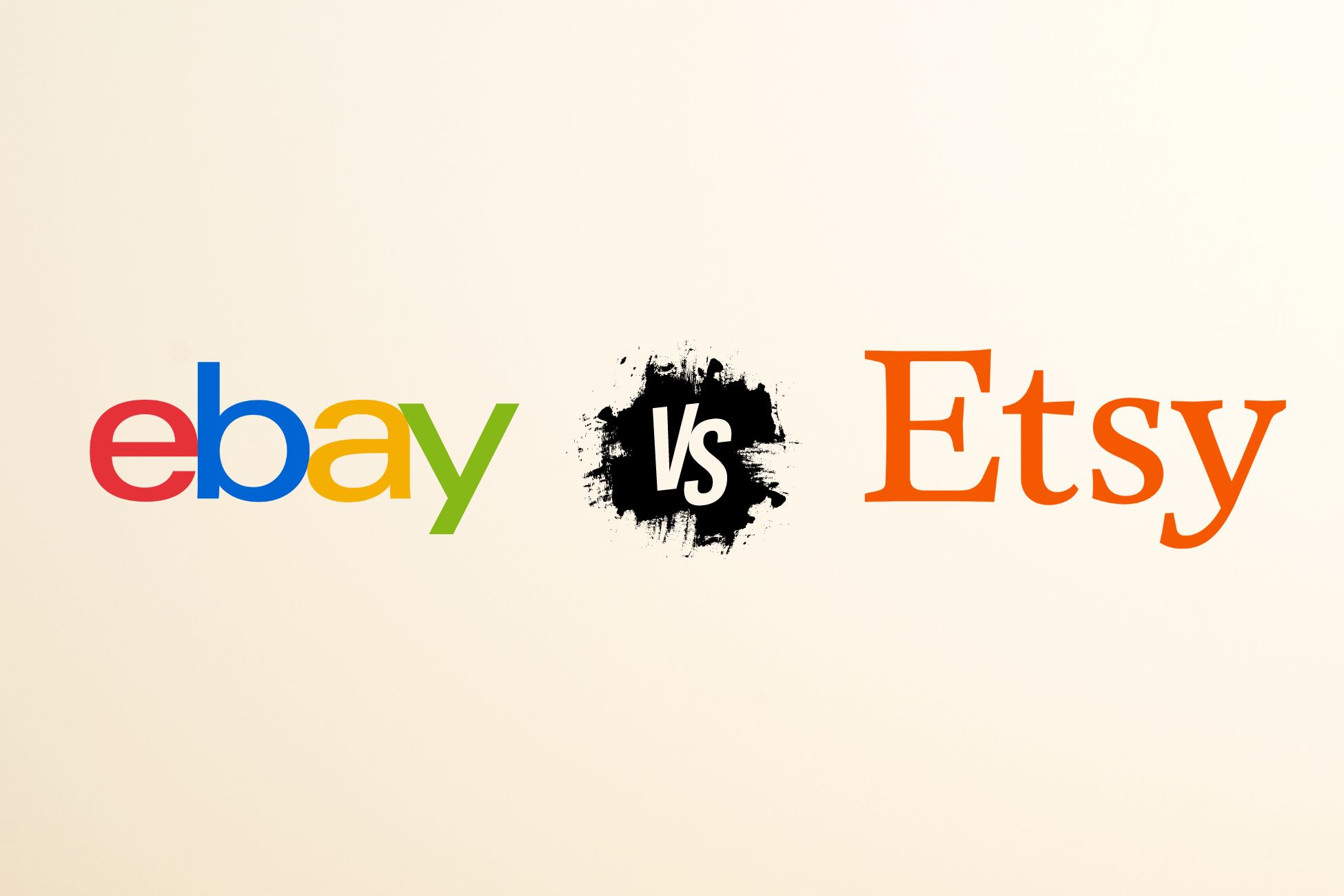When exploring online marketplaces for either starting a business or looking for unique items, you might consider the two most popular platforms, eBay and Etsy. While both platforms facilitate the buying and selling of goods, they cater to different markets and audiences. eBay, a vast and diverse marketplace, allows you to engage in both auctions and straightforward sales for a wide range of items, from electronics to collectibles. Its auction model is distinctive, enabling you to bid on items and potentially secure them at lower prices.
Etsy, on the other hand, has carved out a niche for itself, emphasizing handmade, vintage, and craft supplies. If your interest lies in unique or custom-made products, Etsy’s community-driven approach provides a more curated experience, favoring creators and sellers of handcrafted goods. The platform’s focus on supporting independent creators and small businesses seeks to foster a connection between the artist and the consumer.
Understanding the operations and ethos of both Ebay and Etsy is crucial if you’re considering entering the online marketplace as a seller or buyer. Each platform’s distinct features and audience mean that your approach to selling or purchasing on these sites will need to be tailored accordingly. While the two share the basic premise of connecting buyers and sellers, the broader audience and competitive bidding of eBay contrast with the specialized customer base and artisanal focus of Etsy.
Overview of eBay and Etsy
When you’re looking to understand the online marketplace landscape, eBay and Etsy emerge as leading examples. Each platform caters to different needs and preferences in the e-commerce sphere, with eBay’s auction-based model contrasting Etsy’s niche focus on handmade and vintage goods.
What Is eBay?
eBay is a vast online marketplace that allows you to buy and sell a wide range of goods. It operates on an auction system where you can bid on items, although it also offers “Buy It Now” options for immediate purchase. As a platform, eBay caters to both consumer and business transactions, making it incredibly versatile for various products and services. It has established itself as a significant player in the e-commerce platform field, providing user-friendly tools for listing and managing sales.
What Is Etsy?
Etsy, on the other hand, is an online marketplace best known for its focus on handmade, custom, and vintage items. This platform provides a space for artisans and vintage collectors to sell their unique products. Etsy stands out for supporting microenterprises and individual entrepreneurs. Unlike eBay, Etsy does not feature an auction option. It has built a reputation as a go-to e-commerce site for those seeking original and artisanal items, fostering a community of creators and buyers who value craftsmanship and sustainability.
Types of Products Offered

When considering eBay and Etsy, it’s important to recognize that each platform caters to distinct types of sellers and buyers through their product offerings.
Product Range on eBay
eBay offers a vast product range that includes new and used items across numerous categories. You’ll find everything from the latest electronics to collectibles and antiques. If you’re looking for a particular toy, piece of furniture, or fashion clothing, eBay is likely to have multiple options. It’s also a go-to marketplace for vintage items, especially for collectors looking for specific antiques or unique collectibles.
Unique Goods on Etsy
Etsy is renowned for its selection of unique goods, with a focus on handmade, vintage, and craft supplies. This is the place for custom jewelry, original art, and handmade clothing and accessories. It’s a platform that champions independent creators, so if you’re in search of one-of-a-kind handmade goods or vintage items that tell a story, Etsy’s offerings will appeal to your desire for individuality and craftsmanship.
Selling and Listing Process
When you’re ready to start selling online, understanding the distinct processes for creating listings on eBay and Etsy is essential. Each platform has its unique approach to listings, including differences in fees, formats, and listing strategies.
Creating Listings on eBay
To create a listing on eBay, you need to consider auction-style listings as well as fixed-price listings. For auction-style listings, you set a starting price and buyers place bids. It’s a competitive format that could potentially garner a higher selling price. Fixed-price listings, on the other hand, allow you to set a specific price for buyers to purchase immediately.
- Photos: Up to 12 photos are free.
- Description: Be detailed to improve buyer confidence.
- Listing Fees: eBay charges an insertion fee for each listing and a final value fee when your item sells.
Listing Items on Etsy
On Etsy, you’re targeting a community interested in handmade, vintage, and craft supply items. The process is straightforward:
- Photos: Use high-quality images; the first one serves as your thumbnail.
- Description: Focus on storytelling to connect with your buyers.
- Product Listings: Include tags and categories to help your items get found.
- Listing Fees: Etsy charges a listing fee per item, which is valid for four months or until the item sells.
Each platform enables you to reach different audiences and requires specific strategies to succeed. Whether you choose Etsy vs eBay may depend on what you’re selling and where your buyers are likely to shop.
Fee Structure and Revenue

In this section, you’ll gain a clear understanding of the different fee structures and revenue models of eBay and Etsy. Knowing these specifics will arm you with the insights necessary for navigating these platforms efficiently, whether you’re considering selling or simply curious about their operations.
Understanding eBay Fees
On eBay, fees are a combination of listing (insertion fees) and selling (final value fees). You’re allotted a certain number of free listings per month, but beyond that, each additional listing costs you. The final value fee is a percentage of the total amount of the sale, including shipping, and is only charged once an item sells. eBay also charges payment processing fees for each transaction. If you want more visibility for your listings, promotional fees may apply. These fees contribute significantly to eBay’s revenue and are a key factor in your profit margins as a seller.
Comprehending Etsy’s Fee System
Etsy’s fee system is somewhat different. You have a listing fee for each item you post, which remains active for four months or until the item sells. Selling fees include a transaction fee based on the sale price of the item and a payment processing fee, which varies by country. Etsy also offers a subscription service called Etsy Plus for a monthly fee, granting you tools and discounts for a more customized shop. Similarly to eBay, Etsy collects advertising fees if you choose to promote your items. Understanding these costs is crucial to managing your revenue from sales profitably on Etsy.
Marketing and Promotions

When navigating the online marketplace, understanding the nuances of marketing and promotions on eBay and Etsy is essential. These platforms offer diverse strategies to increase your store visibility and boost sales, each with its unique set of tools tailored to their specific audience.
Advertising on eBay
On eBay, the advertising focus is around Promoted Listings, which allows you to increase the likelihood that potential buyers will see your items. By selecting a percentage of the sale price you’re willing to pay for the promotion, your listings gain enhanced visibility in search results. Utilize eBay’s analytic tools to track performance and adjust strategies accordingly. For effective marketing, consider incorporating SEO practices in your listings to boost organic visibility along with your advertisements.
Etsy’s Marketing Tools
Etsy provides a comprehensive suite of marketing tools designed to promote your products effectively. Through Etsy Ads, you can set a daily budget to advertise your listings across Etsy’s site, enhancing your chances to appear in top search results. The platform also includes a built-in analytics dashboard, offering insights that enable you to optimize your SEO and understand your audience better. Banners and customizable shop layouts are additional promotional features that can capture customers’ attention and convey your shop’s brand identity.
Shipping and Fulfillment

When engaging in online marketplaces such as eBay and Etsy, you play a crucial role in shipping and fulfillment. These processes are essential to customer satisfaction and repeat business. Understanding the nuances of eBay’s and Etsy’s shipping services will ensure your success as a seller on these platforms.
eBay’s Shipping Options
eBay offers a variety of shipping options to meet diverse customer needs. You can provide free shipping to entice customers, or opt for a calculated cost based on item weight and dimensions. eBay also supports shipping discounts for multiple items. In addition, eBay’s Global Shipping Program simplifies international shipping, where you send your items to a US shipping center, and eBay manages the international shipping complexities.
Etsy’s Shipping Solutions
Etsy emphasizes the importance of custom-made and vintage items, with an Etsy shipping guide to help you navigate through their fulfillment process. They offer tools to print shipping labels and track shipments directly from the site. Etsy also provides a feature where you can offer free shipping to customers who spend a certain amount in your shop, enhancing buyer incentive. ItemStacks of valuable shipping supplies and fulfillment practices tailored to your unique Etsy products can enhance your store’s reputation and attract more customers.
Customer Experience

When exploring the platforms of eBay and Etsy, you as a consumer will notice different approaches to customer experience that cater to their respective audiences. eBay’s environment often feels like a vast marketplace where you can bid, buy outright, or make offers, requiring clear and responsive support channels. Etsy, in contrast, fosters a community-centered shopping experience where the connection between buyers and artisans is emphasized, and support extends into community interaction.
Support and Service on eBay
On eBay, customer support is structured to provide assistance with the various complexities that arise from its auction-based selling format. If you encounter an issue, eBay offers a comprehensive help center, and for immediate concerns, you have access to customer service via phone, live chat, or email. eBay’s resolution center is designed to mediate disputes between buyers and sellers, ensuring you receive the assistance needed for a fair outcome. Moreover, feedback and reviews from other customers can guide your purchasing decisions, reflecting the platform’s commitment to transparency.
Community and Support on Etsy
Etsy emphasizes a unique customer experience by cultivating a sense of community among its customer base. As a shopper on Etsy, you benefit from direct interaction with sellers for personalized customer service. This connection allows you to engage with the creative process and often results in a more customized buying experience. Etsy’s support channels assist with any issues, and there is a robust forum where you can exchange advice and experiences with fellow Etsy users. These community features enrich your shopping experience, with the added layer of strong customer support through their dedicated help center for more pressing concerns.
Platforms and Accessibility
Selecting the right online marketplace for your business hinges on accessibility and how comfortably you can navigate the platform. Whether you’re setting your shop up on eBay or Etsy, understanding the interface and the tools at your disposal is crucial for an efficient experience.
Navigating eBay’s Interface
eBay offers a robust Seller Hub where you have a central place for managing your listings, tracking sales, and monitoring performance metrics. The eBay app ensures you can manage your shop on the go, maintaining flexibility and ease of use. Familiarize yourself with the dashboard, which collects crucial data points and notifications in one place, allowing you to stay on top of your tasks conveniently.
Using Etsy’s Platform
Etsy is tailored for creative goods and prides itself on its straightforward interface. With Etsy Plus, sellers get enhanced tools to customize their shop’s appearance and promotional features to highlight their brand. The platform’s rules and guidelines are clearly laid out, ensuring you understand the parameters for selling your handmade or vintage items. Etsy’s commitment to ease of use shines through its clearly delineated categories and search functions, designed to make your products more discoverable.
Marketplace Competition and Alternatives

In the dynamic landscape of e-commerce, understanding how marketplaces like eBay and Etsy position themselves and compete is crucial for leveraging their platforms effectively.
Other Online Marketplaces
In addition to eBay and Etsy, there are several other platforms where you can engage in buying or selling items. Amazon, being a major player, offers a vast marketplace with a wide array of products and a massive base of active buyers. For more niche, handcrafted items, Bonanza is a marketplace that rivals Etsy in its unique product offerings. Walmart competes as a retail giant that has expanded into the online space, aiming to match the exposure and reach of Amazon. For a more socially integrated selling experience, Facebook Marketplace facilitates local and peer-to-peer transactions. Meanwhile, platforms like Shopify empower you to create your own personalized store, offering more control over branding but demanding more effort in gaining exposure. For bargain-focused consumers, Wish presents an alternative space thriving on discounted goods.
Unique Selling Propositions
When it comes to Etsy vs eBay, it’s about understanding their distinct Unique Selling Propositions (USPs). Etsy’s USP revolves around a specialized community focused on handmade, vintage, and craft supplies, providing sellers with a platform characterized by a more bespoke and artisanal market feel. On the flip side, eBay’s strength lies in its versatile marketplace that accommodates a wide spectrum of goods, from second-hand items to new products, alongside a robust auction system that sets it apart. Both platforms offer a gateway to large audiences, though the type of exposure and customer base can differ greatly, which is a critical factor when deciding where to place your products.
Conclusion
When comparing eBay and Etsy, you will find distinct differences tailored to their unique business models. eBay operates as a vast online marketplace offering a wide range of products, from the brand new to the used and collectible. On the other hand, Etsy focuses on handmade, vintage, and craft supplies, carving out a niche for artists and makers.
| Etsy | eBay |
| Niche focus on handmade, vintage items | Broad range of product categories |
| Community-oriented platform | Auction-style and fixed-price listings |
| Emphasizes unique, creative goods | Mix of individual and commercial sellers |
Pros of Etsy include its specialized market that fosters a sense of community and supports independent craftspeople. However, this specialization might limit the variety of goods you can find on the platform. eBay, while less specialized, offers a competitive environment where almost any item can be sourced, providing a diverse shopping experience.
Business-wise, your strategy on each platform must align with your product and audience. Etsy can be a more supportive environment for small-scale artisans and businesses focused on creativity. Meanwhile, eBay may serve better for larger operations, varied inventory, and a more conventional retail approach.
In your online marketplace considerations, weigh these factors to choose the platform that aligns with your personal or business goals. Remember, neither is inherently superior; their value is in their relevance to your needs.
Frequently Asked Questions
When comparing Etsy and eBay, it’s important for you to understand the distinct characteristics each platform offers, both for buyers and sellers. This FAQ section addresses the most pressing queries regarding differences, fees, buyer preferences, selling vintage items, and considerations across various online selling platforms.
What are the differences between selling on Etsy and eBay?
Etsy specializes in handmade, vintage, and craft supply items, presenting a more niche market with a focus on creativity and artisanal products, while eBay’s vast marketplace includes these as well as new, used, refurbished, and mass-produced items across a broad range of categories.
How do selling fees compare between Etsy and eBay?
Etsy charges a listing fee, a transaction fee, and a payment processing fee, whereas eBay’s fees often include an insertion fee and a final value fee, which can vary depending on the item’s category and selling price. You should closely review each platform’s fee structure as they can significantly impact your profits.
Which is better for buyers: Etsy or eBay?
Your preference as a buyer between Etsy or eBay may hinge on what you’re looking for; Etsy is known for unique, handmade, and vintage items, whereas eBay offers a wider range of products, including collectibles and electronics, often with auction-style listings that can lead to competitive prices.
What should I consider when selling vintage items on Etsy versus eBay?
When selling vintage items, consider Etsy for its community that appreciates and seeks out such unique items. However, eBay’s larger customer base and auction format can be beneficial if your items are highly sought after and could fetch a higher price in a competitive bidding situation.
How do eBay, Etsy, and Mercari differ for sellers?
Etsy is tailored toward artisanal goods, eBay offers a broad marketplace with auction features, and Mercari is a rising platform that caters to a wide range of categories with a user-friendly interface and competitive selling fees. Each platform’s audience and fee structure should guide your choice.
What are the pros and cons of using Etsy, eBay, or Shopify for an online business?
Etsy provides a niche market for unique handmade and vintage goods but with higher fees, eBay reaches a large and diverse market with a variety of selling formats, and Shopify allows for brand customization with your own dedicated store, albeit with monthly hosting costs and the requirement for self-promotion.



